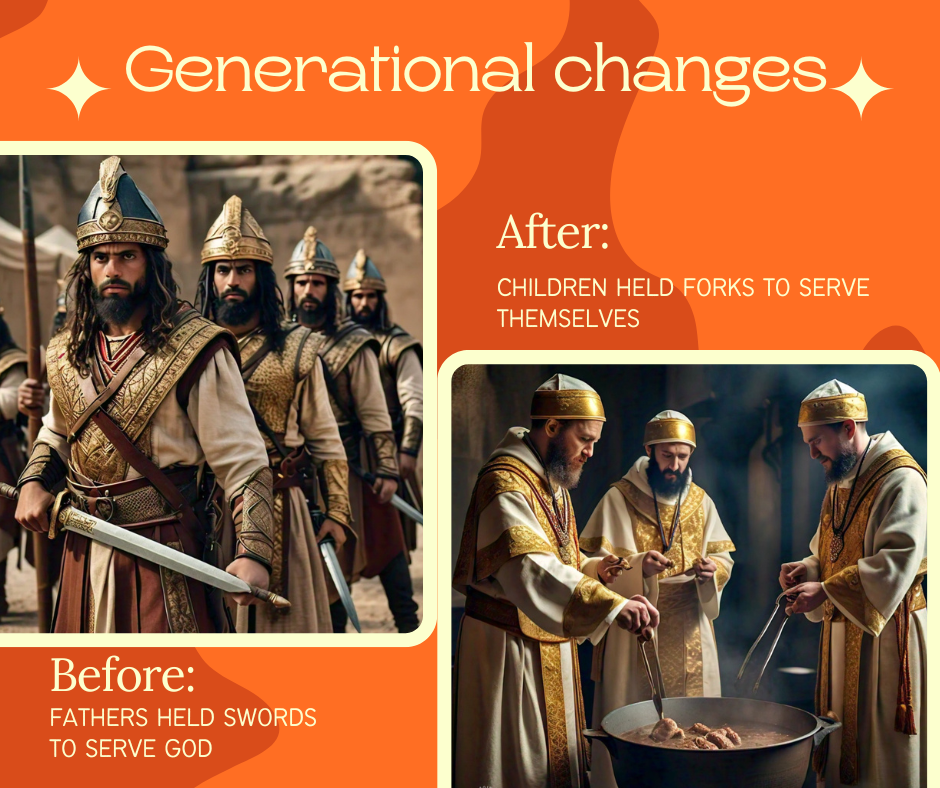
Some people wonder what life would be like if they were born into great or wealthy families. They may think that such an inheritance would solve all their troubles and difficulties. They might dream about the legacy left to them by their forefathers—whether it’s long-invested stocks, family heirlooms, or something they could boast about.
As Christians, we also have an inheritance, but it’s not measured by worldly standards. We are heirs of faith, a treasure passed down from our spiritual fathers and mothers. Paul reminds Timothy that his faith was handed down from his grandmother Lois and his mother Eunice. This kind of inheritance—faith—is far more precious than any material possession.
If anyone feels that their parents or previous generations did not know God and left no spiritual inheritance, they should remember that Christian inheritance doesn’t depend on our earthly lineage. It’s about spiritual things—our beliefs and actions. We are all sons and daughters of Abraham, inheriting the promises given to him.
By faith he made his home in the promised land like a stranger in a foreign country; he lived in tents, as did Isaac and Jacob, who were heirs with him of the same promise. Hebrews 11:9
Abraham received promises from God, and despite his great wealth and resources, he did not build great houses or secure land by force. Instead, he waited patiently, living as a foreigner in Canaan, trusting that God, the divine architect, would build his true home.
If we were to receive promises from God, our instinct might be to tell everyone and then strive to fulfill those promises through our own wisdom and strength. However, Abraham provides us with a different example. He lived in the promised land as a foreigner, trusting that God, the divine architect, would build his home. As Hebrews 11:10 says, “For he was looking forward to the city with foundations, whose architect and builder is God.“
Abraham’s sons followed his example, living as foreigners in the promised land without complaint or accusation. Despite their great wealth and the power to build cities, they chose to live in the same humble way as Abraham. Through these virtues and choices, they became heirs of the same promise and faith.
We are also part of these great promises and covenants. If we are willing to live by faith and make sacrifices in our lives, these promises will surely be fulfilled. The question is, are we ready to become heirs of faith?
David received incredible promises from God, including the assurance that he would always have a descendant on the throne of Israel. However, this promise came with a condition: his heirs were to listen to God and follow His will. Unfortunately, David’s children failed to uphold this, and as a result, they could not maintain their rule over all of Israel for long. (This promise is ultimately fulfilled in Jesus.)
In today’s world, there is often a rush to surpass our forefathers, and we are quick to judge and label the previous generation as outdated. However, the truth is that we should follow in the footsteps of a blessed generation so that we can inherit the blessings and promises that come with faithfulness.
Then Jeremiah said to the family of the Recabites, “This is what the Lord Almighty, the God of Israel says: ‘You have obeyed the commands of your forefather Jonadab and have followed all his instructions and have done everything he ordered.’ Therefore, this is what the Lord Almighty, the God of Israel, says: ‘Jonadab son of Recab shall never fail to have a man to serve me.’” Jeremiah 35:18-19
In the Bible, we see the descendants of Jonadab, the Recabites, faithfully following everything their ancestor instructed them to do. They refrained from drinking wine, building houses, or settling down because their forefather had commanded them to live this way. While others around them indulged in wine and settled in towns, the Recabites chose to honor their ancestor’s wishes. God pointed to them as an example to Israel, saying, “See how the children of Jonadab listen and follow his instructions, whereas the Israelites quickly abandoned their Father’s commands.” Following our forefathers’ instructions has its advantages—it enables us to stand firm and continuously serve God.
Let’s also consider the lives of the Levites. Levi, along with Simeon, acted in anger and took swords to kill an entire town out of revenge. Because of this, Jacob cursed them, declaring that no one should follow their counsel or be part of their assembly. But later, we see that a Levite, in faith, rose above his lineage’s past actions. During a time of great tribulation, when the king ordered the execution of all newborn boys in Israel, and many were afraid to start families, this Levite, in faith, chose to form a family. God saw his faith and was pleased, blessing him with Moses, whom God chose to lead His people.
When the Israelites made the golden calf and sinned, Moses called out to the people, asking who would stand for God. The Levites, who had once been cursed by their forefather Jacob, rose to the occasion. They took swords in hand and, in obedience to God, chose to kill their brethren and neighbors who had sinned. God saw their zeal and chose them as the priests of Israel.

Later, Phinehas, the grandson of Aaron, demonstrated a similar zeal for God. When he saw a couple sinning against God, he took a spear and killed them, stopping the plague among the Israelites. God was pleased with Phinehas’s fervor and promised that his descendants would serve Him continuously.
This shows that one can break free from the curses and sins of their forefathers if they are willing to take decisive steps toward God. However, it is crucial to remain faithful to God, or everything can be lost. Eli, a descendant of Levi, was a priest, but his sons were not like Phinehas. Instead of wielding spears and swords in service to God, they used forks to take the choicest meat from sacrifices meant for God. Because of their greed and disrespect, God declared that Eli’s descendants would find distress in God’s dwelling (1 Samuel 2:32). When others sang about the beauty of God’s dwelling, Eli’s children found distress there.
One can redeem the mistakes of their forefathers or, conversely, undo the good that has been done. Proverbs 4:1-2 says, “Listen, my sons, to a father’s instruction; pay attention and gain understanding. I give you sound learning, so do not forsake my teaching. “[Proverbs 4 is full of such instruction from a father to son.]
If we are willing to uphold the teachings and faith of our forefathers, it will go well with us. We will find ourselves in a place of continuous service to God, ready and prepared—just as arrows are kept in the QUIVER OF GOD.



May God bless you all..